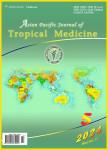Effect of PDGF-Rb antagonist imatinib on endometrial injury repairing in mouse model
Effect of PDGF-Rb antagonist imatinib on endometrial injury repairing in mouse model作者机构:Department of Reproductive Medicine Affiliated Yantai Yuhuangding Hospital of Qingdao University Medical College Department of Thoracic Surgery Affiliated Yantai Yuhuangding Hospital of Qingdao University Medical College
出 版 物:《Asian Pacific Journal of Tropical Medicine》 (亚太热带医药杂志(英文版))
年 卷 期:2015年第8卷第7期
页 面:553-557页
核心收录:
学科分类:1002[医学-临床医学] 100211[医学-妇产科学] 10[医学]
基 金:supported by Science and Technology Plan Project of Yantai(No.2009155-21)
主 题:PDGF-Rb Endometrium Imatinib mesylate BrdU MVD
摘 要:Objective: To study the effects of PDGF-Rb antagonists imatinib on endometrial injury repairing in the mouse model. Methods: The cultured MSCs cells from male mice were marked with Brd U in vitro, and then transplanted to the female mice which suffered from radiation injury through tail vein, PDGF-Rb antagonists imatinib was injected through abdominal cavity. Four groups were arranged, which were radiation transplantation group, normal control group, imatinib intervention group and radiation control group. Brd U incorporation, SRY expression and MVD status were detected in uterus of mice. Results: SRY gene was negative expressed in normal control group and radiation control group. SRY gene presented positive in radiation transplantation group and imatinib intervention group; Brd U incorporation showed negative in radiation control group and normal control group which died in the early stage in mice; the incorporation of Brd U was higher in radiation transplantation group compared with imatinib intervention group; CD34 was positive on the uterus of all the four groups,which showed highest in radiation control group and lowest in radiation control group; The MVD in imatinib intervention group was lower than radiation control group; the difference of MVD was significantly compared with normal control group(P0.05). Conclusions: PDGF-Rb antagonists imatinib could inhibit the repairing function of MSCs in the endometrial lesions in mice.



